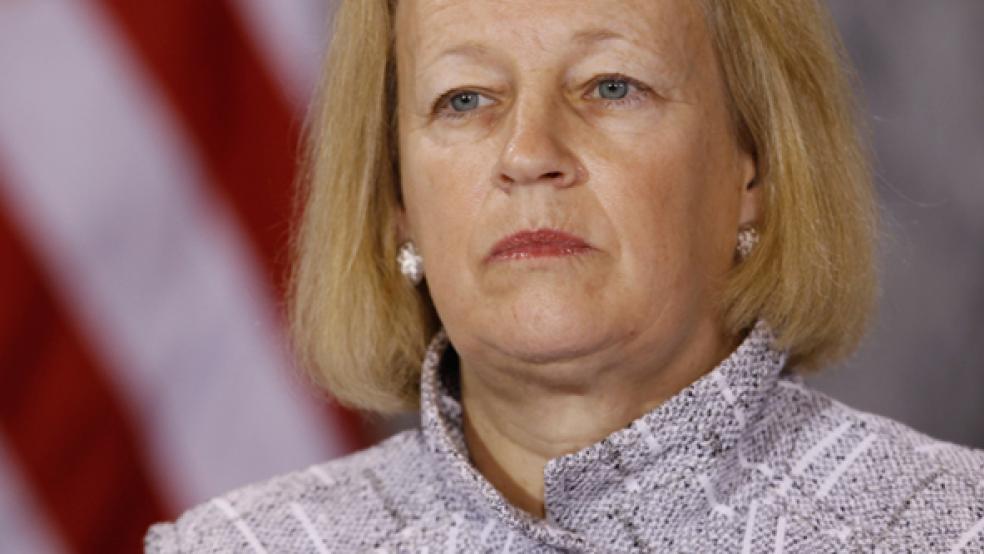When Mary Schapiro took the helm of the U.S. Securities and Exchange Commission, many said she was the perfect choice to revitalize an agency mired in controversy and low morale after failing to spot the Bernard L. Madoff multi-billion-dollar Ponzi scandal and preventing the collapse of Lehman Brothers.
Schapiro boasted a gold-plated resume as the immediate past chairperson of the Financial Industry Regulatory Authority, the securities industry self-regulatory organization for broker-dealers and exchanges, and as a financial services regulator in the administrations of Bill Clinton, George H.W. Bush, and Ronald Reagan. After President Obama appointed her the first woman to head the SEC in 2009, Forbes ranked her the 56th most powerful woman in the world.
But Schapiro and her agency have suffered a string of setbacks and scandals during the past two years, most recently scathing criticism of their response to an inquiry into destruction of records. A year after it was first warned that it might be violating federal law, the SEC is still breaking the law by destroying records of closed enforcement cases, according to a lawyer in the agency’s enforcement division.
Early this year, it was revealed that the former top lawyer at the SEC, David M. Becker, had inherited an investment account from his mother before he became SEC general counsel in 2009 The account had been managed by Madoff , yet Becker subsequently took part in SEC’s work on certain Madoff-related matters dealing with how the scheme’s victims would be compensated – which some members of Congress viewed as a potential conflict of interest. Pending reports from the SEC inspector general are likely to provide more fuel for the agency's critics.
One thing is clear: Schapiro’s tenure has proved to be a major disappointment .
"I'd give her a solid B, B-minus," said David Min, associate director for financial markets policy at the Center for American Progress. "There's a frustration that regulators and prosecutors are not going after the bad guys who got us into this financial crisis."
Some of the SEC's shortcomings were beyond Schapiro's control. Congressional Republicans have frustrated some SEC efforts by restricting funding and seeking to scale back its power. "The agency has made tremendous strides and will continue to do so as resources permit," spokesman John Nester said in the commission's defense.
Moreover, many of the problems – including low morale, defensiveness, potential or real conflicts of interest and a revolving door with the private sector -- predated Shapiro’s tenure.
"You can't hold the chairman responsible for everything that happens at an agency," said John C. Coffee Jr., a Columbia University law professor and expert on the SEC. "It's never been harder to be a chairman of the SEC than with the current [GOP controlled] House of Representatives that really wants to take apart a number of federal agencies."
Still, the agency’s mishaps and controversies have been substantial, almost from the time Schapiro moved into the chairman’s office. Here, in chronological order, is a list of some of the SEC’s biggest mistakes and missed opportunities:
March 2010 -- Lehman Brothers Gets a Free Pass.
The harshest criticism of the SEC is that it failed to punish Wall Street firms and executives for their roles in triggering the 2008 financial collapse and subsequent devastating recession.
A 2,200 page report released in March 2010 by the bankruptcy examiner probing Lehman’s ' collapse offered a "road map" to holding the firm and its executives accountable, but the SEC did nothing Coffee said. Private plaintiffs have been successful thus far in bringing a complaint against the firm, whose collapse arguably sparked the panic over financial market liquidity and toxic assets.
"In terms of the SEC's performance, like much of the country I am disappointed by how little they have done on the enforcement side," Coffee said. "It is a true failure that the SEC has refused to sue any of the senior officers of Lehman."
SEC's Nester defended the agency's actions in the wake of the financial crisis. "We can only bring actions if people violated the law. We've brought 72 enforcement actions against individuals and entities, 35 of whom were CEOs, CFOs and other corporate officers. We've ordered $1.1 billion in penalties."
October 2010 -- "Weak" settlement with Countrywide Financial executives
When the SEC reached a $67.5 million settlement with former Countrywide Financial chief executive Angelo Mozilo, the agency touted it as the largest-ever SEC fine paid by an individual. But critics pointed out that the settlement allows Mozilo and other executives to avoid a trial that might offer openings for criminal charges or private lawsuits.
"We have been disappointed by some of the weak settlements that have been approved," said Michael Smallberg, an investigator at the Project on Government Oversight. "There's still a lot of justifiable confusion and anger over the lack of prosecutions or criminal referrals for the major actors in the financial crisis."
December 2010 -- SEC leasing scandal
Late last year the SEC revealed that officials signed a $556 million, 10-year lease for a 900,000 square foot office space before receiving budget authorization for the expanded workforce and budget. Ultimately, taxpayers are likely to be on the hook for millions of dollars of unused office space. Schapiro called the episode a mistake and relinquished the SEC's leasing authority to the General Services Administration.
February 2011 -- SEC's David Becker tied to Madoff funds
Schapiro was blasted by members of Congress for allowing former general counsel Becker to take part in the SEC’s investigation of the Madoff case when he had inherited a stake in Madoff’s bogus investment funds. The ties came to light after Becker was named a defendant by trustees seeing to recover funds for swindled investors, and after the SEC announced that Becker was leaving his post. Lawmakers grilled Schapiro about why Becker was allowed to continue to weigh in on the Madoff case, rather than recusing himself due to personal interests. The SEC's inspector general is investigating the matter.
July 2011 -- Court vacates SEC proxy-access rule
Perhaps the SEC’s biggest setback was a court ruling that could undermine its ability to implement the nearly 100 rules ordered by the Dodd-Frank financial overhaul law. The D.C. circuit court in July struck down an SEC rule that would have given shareholders more power to nominate directors for the boards of publicly traded companies, blasting the agency for failing to adequately consider the cost-benefit tradeoffs.
The court decision sent the commission back to the drawing boards to craft a rule championed by Schapiro. It also opened up an avenue for the private sector to fight other Dodd-Frank rules. The U.S. Chamber of Commerce and Business Roundtable, which successfully sued over the proxy access rule, are looking carefully at other rules for potential legal challenges. The proxy access rule, adopted by the commission in August 2010, required publicly traded corporations and investment firms to disseminate information—at company expense—about board nominations made by shareholders.
The D.C. circuit is an unfavorable venue for the SEC to fight future battles, Coffee said.
August 2011 -- Document destruction allegations
Sen. Chuck Grassley, R-Iowa, revealed in August that a widely followed SEC policy called for enforcement officials to destroy records from inquiries that were closed. An SEC whistleblower reported the policy as a possible violation of federal law, and claimed that documents were destroyed relating to Madoff as well as some of the firms at the center of the 2008 financial crisis, including Goldman Sachs, Wells Fargo, Bank of America, Deutsche Bank, Lehman Brothers and the SAC Capital hedge fund.
Last week, Grassley released a new letter from the lawyer for the SEC official, Darcy Flynn, alleging that records continue to be destroyed even after the commission told the National Archives it was halting purges.
"It doesn't make sense that an agency responsible for investigations would want to get rid of potential evidence," Grassley wrote last month in a newsletter to constituents. "If these charges are true, the agency needs to explain why it destroyed documents, how many documents it destroyed over what timeframe, and to what extent its actions were consistent with the law."





